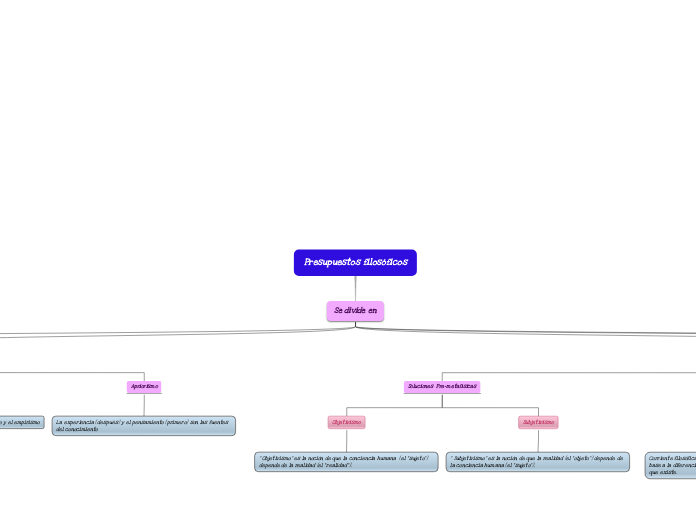a kevin garizabalo 5 éve
638
Presupuestos filosóficos

a kevin garizabalo 5 éve
638

Még több ilyen
Type in the name of the multiple-perspectives text.
Example: Bridge to Terabithia by Katherine Paterson
Identify an important issue from the text that is being presented from different angles. Type it in.
Example: Jesse's drawing talent.
tiene su fin en el mismo ser, no es algo transitorio que requiere de un principio exterior
Es lo que está más allá de algo, que supera los límites
Decide on the fourth point of view
Type in the name of the last character whose perspective on the issue you are going to present.
Example: Leslie Burke, Jesse's new next-door neighbor, and best friend.
formas de conocimiento inmediato que no provienen de procesos racionales y conscientes
Point of view
Type in a relevant quote that highlights the character's point of view. Try to follow a citation format: author's name, chapter, and page.
Example: I can't get the poetry of the trees,' he said. She nodded. Don't worry,' she said. You will someday. He believed her.' (Paterson, 4. 24)
Se da a través de la razón basándose en la realidad
How is the viewpoint introduced in the story?
Choose an answer:
Whose character does the third point of view belong to?
Type in his/her name.
Example: Mr. Aarons, Jesse's father.
Monismo y Panteísmo
Monismo: intenta explicar la realidad a partir de un principio absoluto Panteísmo: sostiene que el universo es Dios que se manifiesta en el universo.
Dualismo y teísmo
Dualismo: teoría que reconoce sólo 2 sustancias Teísmo: creencia en Dios, el cual interviene en el mundo y el hombre
Fenomenalismo
Posición filosófica que sostiene que la realidad no tiene existencia "en sí misma" no conocemos las cosas como son en sí, sino como se nos aparecen
Idealismo
Idealismo se denomina la rama del pensamiento filosófico que fundamenta sus doctrinas en la preponderancia de las ideas como principio del ser y el conocer, opuesta al materialismo.
Realismo
Corriente filosófica que trata de explicar el origen de las cosas con base a la diferenciación de lo que existe realmente, y lo que se cree que existe.
What does the character think, say or do that suggests their perspective on the issue?
Type in a quote and try to maintain the citation format.
Example: 'He would like to show his drawings to his dad, but he didn't dare. (...) He'd thought his dad would be pleased. He wasn't. What are they teaching in that damn school? he had asked.' (Paterson, 2.8)
” Subjetivismo” es la noción de que la realidad (el “objeto”) depende de la conciencia humana (el “sujeto”).
Objetivismo
What kind of narration introduces the viewpoint?
Choose an answer:
” Objetivismo” es la noción de que la conciencia humana (el “sujeto”) depende de la realidad (el “realidad”).
Decide on the second point of view
Name the character (it can either be the main character or one of the supporting characters) whose point of view you are presenting.
Example: Miss Edmunds, Jesse's music teacher.
La experiencia (después) y el pensamiento (primero) son las fuentes del conocimiento
El punto medio entre el racionalismo y el empirismo
La mente es un papel en blanco que se va llenando de conocimientos
Type in a quote that points out the character's position about the issue.
Try to follow a citation format: author's name, chapter, and page.
Example: 'She said he was unusually talented, and she hoped he wouldn't let anything discourage him.' (Paterson, 2. 8)
Existe un conocimiento innato y se llega a la verdad por la razón
How is the viewpoint introduced in the story?
Choose an answer:
Decide on the first point of view you are going to present.
Type in the name of the character (it can either be the main character or one of the supporting characters) whose point of view belongs to.
Example: Jesse Oliver Aarons, Jr., the main character of the novel, a fifth-grader living in a rural Southern area.
Es posible conocer, hay que examinar todas las afirmaciones de la razón y no aceptar nada despreocupadamente
Teoría filosófica, según la cuál el único medio de juzgar la verdad de una doctrina moral, social o científica consiste en considerar sus efectos prácticos
Declara cómo fin de la acción moral la realización de un estado subjetivo, del placer o de la felicidad
Solo hay verdades en relación a una humanidad determinada
Afirma qué no hay ningún saber firme, ni puede encontrarse ninguna opinión segura
Type in a relevant quote that highlights the character's point of view towards
Se divide en.
Try following a citation format: author's name, chapter, and page.
Example: 'Jesse drew the way some people drank whiskey. (...) Lord, he loved to draw. (...) When he was in first grade, he told his father that he wanted to be an artist when he grew up.' (Paterson, 2. 7)
Doctrina filosófica, opuesta al escepticismo qué afirma qué la mente humana tiene capacidad para conocer las verdades
What type of narration introduces the viewpoint?
Choose an answer: